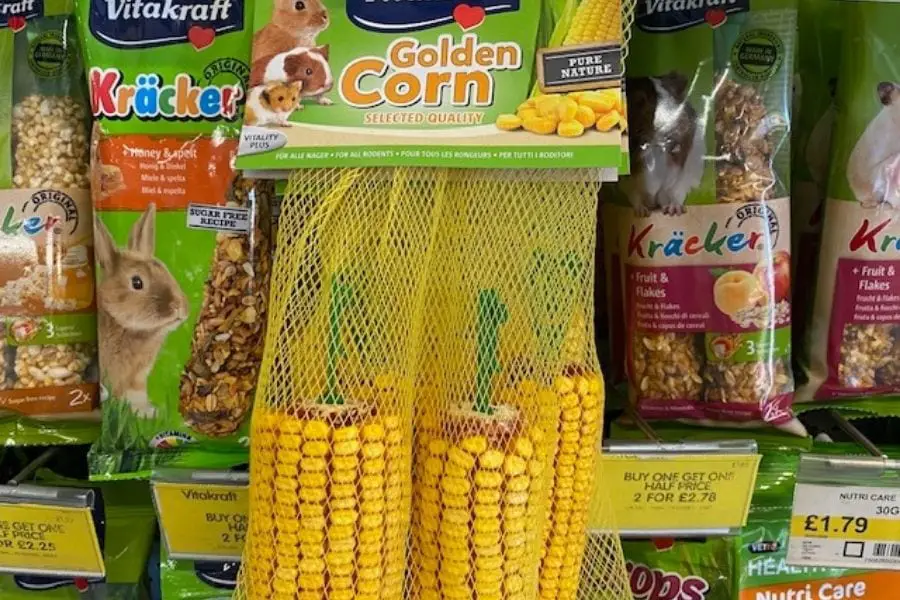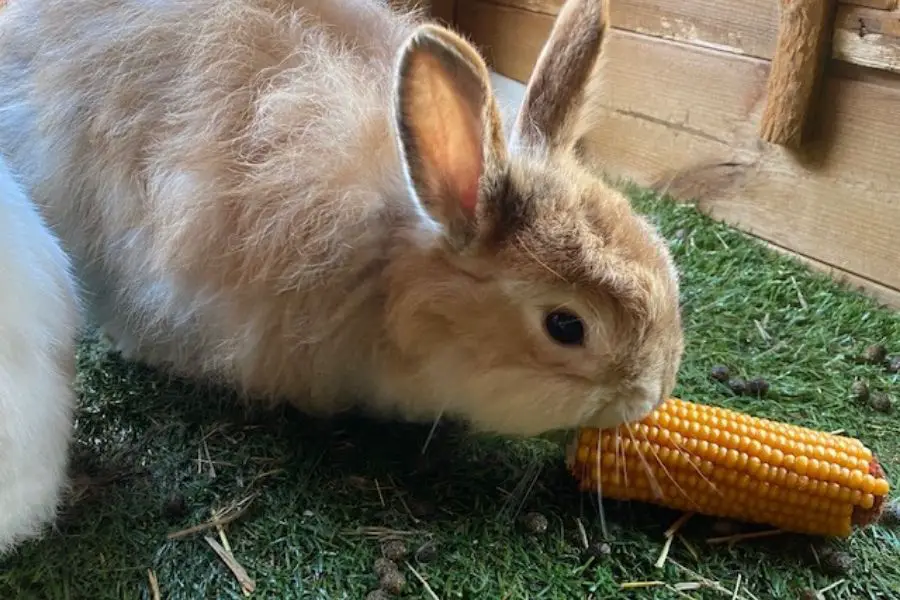Rabbits eat a variety of different fruits and vegetables, however, not all are good for them. Some vegetables and fruits are very high in sugar while others have chemicals that can harm a rabbit’s delicate digestive system, in short, it’s very important to know which ones are safe. In this short post, we’re taking a look at sweetcorn and its various types. So can rabbits eat corn?
Rabbits can eat dried sweetcorn but not fresh. The endosperm of fresh corn is soft and the hull of the corn is pliable which means that entire kernels may be swallowed with little chewing. If this happens a rabbit is at risk of impactions or gastrointestinal stasis.
Good and bad fruit and veg
Rabbits have a sweet tooth but high sugar fruit and root vegetables (such as carrots) should only be given to rabbits in very small amounts. Seeds and pips can also be poisonous to rabbits.
Corn seeds while not poisonous are quite large and their indigestible outer shell can get stuck in a rabbit’s gastrointestinal tract leading to the aforementioned impactions, gut stasis, or even in some cases internal injury.
Rabbit digestive system
As herbivores, a rabbit’s digestive system is designed to consume large amounts of high fiber plant matter. This includes plants that other mammals are unable to break down as a source of nutrients.
In order to meet their nutrient needs, rabbits must consume a lot of this plant matter however their gastrointestinal tract is small in comparison to some other herbivores.
For this reason plant material moves through a rabbit’s digestive system quickly and understandably it can become a real problem if the rabbit’s gut is stopped from moving as it should.

In order to prevent this and keep a rabbit in good digestive health hay should make up approximately 80% of a rabbit’s diet. An unlimited amount of hay should be provided to a rabbit that may eat a ball of hay equivalent to his own size each day!
Providing a rabbit with a fiber-rich diet from high-quality pellets and hays will also contribute to good dental health (teeth will be kept at a healthy length through constant chewing).
Do rabbits like corn?
When it comes to fruit and vegetables, rabbits each have their own likes and dislikes. They also love treats and will usually beg for all manner of things that may not necessarily be very good for them.
Treats available in pet stores are usually very high in refined sugars, some may contain seeds or nuts which are also not a normal part of a rabbit’s diet and can therefore upset the balance of enzymes within a rabbit’s digestive system.
While it can be tempting to feed a rabbit any number of the many different and interesting varieties of treat available in pet stores it’s important to remember that a rabbit’s digestive system is not the same as ours. It does not need the same degree of variety that we humans enjoy.

Of course, everyone likes to spoil their pets sometimes and rabbits shouldn’t miss out either. Treats of course serve a purpose to keep your rabbit interested and build a bond. When choosing treats for rabbits, preferred choices are small pieces of herbs such as basil, carrot tops, or small fruit pieces such as berries.
Chocolate style drops high in processed sugar or dried corn cobs which are frequently sold as treats for rabbits (despite the risks) should be avoided completely.
Remember, rabbits can’t be trusted to not overeat if they are offered an excessive amount of sweet treats! Of course, treats should be given but you will need to show necessary restraint on their behalf and stop them regardless of how cute they look (or how much they beg!).
Corn is high in vitamins C and A and also has a lot of fiber however aside from the problems associated with the digestion of corn there are other reasons why corn in a natural form is not a good choice of food for a rabbit which we’ve covered below.
Corn is high in starch
Despite its good nutritional profile, corn is comprised of starchy carbohydrates, too many of which can be very bad for a rabbit. High sugar can increase the risk of the rabbit experiencing painful conditions such as trapped wind (not to mention the possibility of a (chubby unhealthy rabbit!).
Corn is usually high in pesticides
Corn is a favorite of locusts and with large swarms able to eat 160,000 tonnes of food each day preserving the crop means that corn is usually covered in insecticides, some of these can be very harmful if eaten by a rabbit.
Can rabbits eat corn silk or husks?
While corn silk may look like an appetising meal for a rabbit, its stringy composition is not well suited for them. It will almost certainly be difficult for a rabbit to chew properly and may even block the bunny’s windpipe.
Husks have a similar nutritional value to the kernels however there are much better and healthier alternatives for rabbits such as leafy greens.
Can my rabbit have dried corn?
We wondered this too so we decided to ask the question, shop-bought corn for rabbits is usually of the dried variety so we contacted a leading rabbit treat manufacturer for comment, we asked them ‘why despite the general consensus (that corn was terribly bad for rabbits) did they continued to sell dry corn as a rabbit treat?’ here is the reply we got back.
Dear sir
I am contacting you in response to your recent inquiry concerning our dried rabbit corn treats.
I referred your inquiry to our Quality Assurance department and our supplier has provided us with the following information:
The hull of corn kernels is composed of tough polysaccharides namely cellulose, hemicelluloses A, B, and C, and lignin. While these polysaccharides are classed as indigestible for humans rabbits have a very specialized gut flora that can partially breakdown and extract vital nutrients.
Whilst not all of these fibers are digested completely they are still very important to the health of the rabbit and have an equivalent benefit to the rabbit’s health as dietary fiber does in humans.
Rabbits require both digestible and indigestible fibers like lignin in their diet in fact wild rabbits will eat the bark from certain trees which are a rich source of digestible and indigestible fibers despite not being able to fully digest them.
Corn is a common concern with rabbit owners however most, in particular, those surrounding impactions actually apply more to fresh corn rather than corn in its dried form. Here is the usual issue…
The shape and position of a rabbits head and eyes mean that they struggle to see their food as they eat. Rabbits also have no gag reflex and cannot vomit as most other animals do so the feel the food with the lips before biting into it with the incisors. Food is then ground with molars to predigest it.
With dried corn, a rabbit’s incisors will grind the kernels into very small bits before swallowing but fresh corn is a different matter. The endosperm of fresh corn is soft and the hull is pliable, as a result, the rabbit has no problem swallowing whole kernels with little chewing.
When a rabbit does this and eats a lot of fresh corn hulls whole, these can potentially result in an intestinal impaction. However, even then risk can depend on other factors.
Impactions can be caused by the rabbit’s own fur and even some hays. Rabbits ingest fur when grooming, (you may have seen them pull fur as they groom, and it’s natural that some of this will be ingested).
Eating hay with its indigestible fiber works to keep the rabbit’s gut moving which then helps to prevent hairball blockages. Rabbits that have little room to exercise will also have reduced gut mobility so the combination of feeding fresh whole cobs (or ingesting hair), a lack of good hay, and limited exercise tend, together, to result in most cases of intestinal blockage.
We have seen a lot of people feed their rabbits fresh corn cobs with no problems which suggest that one or even a combination of these other factors is likely to be playing a part.
We appreciate your concern for your pet however it is also worth mentioning that 90% of rabbit treats use corn or other cereals as their main ingredients. If corn was suddenly no longer able to be used as an ingredient for rabbit treats most retailers would need to remove a large proportion of their treats apart from cereal free ‘Naturals’ ranges.
Cereal treats made from processed cereals which make the starch more biologically available have less fibre and vitamins/minerals, arguably these are worse still.
The key point to stress with our dried corn cobs is that they are marketed as treats only. We even put responsible warming on the packaging. It is complementary pet food and just like us rabbits can also have too much of a good thing.
While we don’t recommend feeding corn every day one dried corn cob dried corn occasionally should not cause any long-term negative effects to an already healthy rabbit.
I hope you find this information useful.
Thank you for contacting us.
So, it would appear that eating dried corn may carry less of a risk than raw corn, however, it is up to you to make these important decisions in the best interest of your rabbit.
Wrap Up
Although starchy and full of carbs there seems to be a solid argument that dried corn in small quantities will do no real harm to a rabbit. Certainly, rabbits enjoy it, particularly in its dried form and it also has some nutrients that are beneficial.
That said, as responsible rabbit owners most of us like to do our very best to keep our rabbits healthy and with so many great alternative vegetables available for rabbits, corn in any of its forms can never be 100% risk free.

Corn is a high carbohydrate food that in small quantities may just cause minor uncomfortable bloating and gas however in more serious cases may lead to the loss of your beloved friend.
This short article simply aims to give you the facts that allow you to make your own decision in the best interests of your rabbit.
Remember rabbits are delicate animals, always do your best to provide a healthy balanced diet with plenty of hay, and remember that health should always be at the forefront of your mind when making food choices.
Further Reading
Is Cracked Corn Bad for Rabbits? rabbitsonline.net
Safe foods suitable for rabbits saveafluff.co.uk
Can Rabbits Eat Corn on the Cob? farmhouseguide.com
